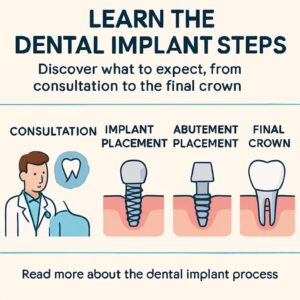When To Get Dental Implants? A Guide To Restoring Your Smile Losing a tooth raises a big question: when to get dental implants. Timing matters for function, appearance, and long-term bone health. This guide explains common signs you’re ready, health factors that affect timing, what the implant timeline looks like, temporary options, questions to ask your team, and how Grand Dental Implant Centers can help you decide.
When to Get Dental Implants: Common Signs You’re Ready
Visible tooth loss or gaps
Missing one or more teeth changes your bite, speech, and smile. If a gap makes you self-conscious or affects eating and talking, consider implants. They restore both function and appearance and prevent neighboring teeth from shifting.
Difficulty chewing or ongoing discomfort
If chewing is painful or you constantly tweak dentures, implants can offer a stable, long-term solution. Persistent discomfort that affects daily life is a strong sign it may be time for implants.
Failing fillings, crowns, or bridges
When restorations repeatedly fail on the same tooth, switching to an implant may be smarter than repairing weak structures. Implants replace the tooth root and avoid constant rework.
Health and oral factors that determine timing
Bone health and how long a tooth has been missing
Bone shrinks after a tooth is lost. That makes placement harder later. Deciding when to get dental implants in Aurora, IL often means earlier placement simplifies treatment and reduces the need for grafting.
Gum disease and active infection
Active gum disease raises implant failure risk. Treating infection and stabilizing gums is essential before placement. Your team will clear disease first to improve success.
Medical conditions and lifestyle (smoking, diabetes, medications)
Chronic conditions, blood sugar control, tobacco use, and some medications affect healing. Your implant team will review your health and may recommend delaying or optimizing care before surgery.
What the implant process looks like and typical timeline
Evaluation and planning (CBCT, scans, digital impressions)
Planning uses 3D CBCT imaging and intraoral scans to map bone and nerves. This precision helps decide exact timing and whether immediate loading is safe.
Possible preparatory procedures: extractions, bone grafts, sinus lifts
If extractions or grafts are needed, expect extra healing time—often several months. These steps set a stable foundation for the implant.
Placement to restoration: healing and follow-up
After placement, osseointegration takes 2–6 months depending on location and grafting. Once healed, a custom crown, bridge, or denture is attached and adjusted for fit.
Short-term alternatives while you wait
Removable dentures and bridges
Dentures and bridges restore appearance quickly and are less invasive, but may need frequent adjustments and don’t stop bone loss.
Immediate-load implants vs. delayed approach
Some patients qualify for same-day (immediate-load) implants and temporary crowns. This depends on bone quality and health; delayed placement remains safer for many.
Questions to ask your implant team
Am I a candidate? Do I need bone grafting or sinus work? What are the risks and success rates? What sedation and financing options are available? How long will the full process take?
About Grand Dental Implant Centers
Grand Dental Implant Centers provides implant-focused care across Illinois locations, including Lake Zurich, and Wilmington. The practice uses CBCT imaging, in-house labs, zirconia restorations, soft tissue lasers, IV sedation, and financing to support single-tooth and full-mouth solutions.
Clinician highlights
Lead clinicians include Dr. Cole Wells and Dr. Brandon Bice, both trained in implant and restorative dentistry with memberships in ADA and ISDS.
Quick FAQs
How long after extraction can I get implants? Often 2–4 months, but grafting or immediate placement can change timing. Are implants painful? Surgery has discomfort, but sedation and modern techniques keep pain manageable. Most patients report mild to moderate soreness. What is the success rate? Dental implants have a success rate above 90–95% with proper care. How long do implants last? With good oral hygiene and regular care, implants can last decades.
Closing CTA
If you’re wondering when to get dental implants, schedule a consult to get a personalized timeline and treatment plan. Grand Dental Implant Centers can evaluate your needs and explain options to restore function and confidence.






